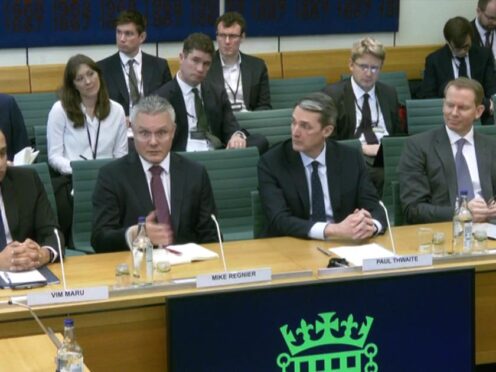
Some of the UK’s biggest banks have said they closed more accounts last year than in 2022, but that in most cases it was not because of concerns about a customer’s reputation.
Barclays, Santander, Lloyds and NatWest also called on social media platforms to do more to tackle fraud.
Bosses of the four high street lenders were quizzed by a group of MPs on the Treasury Committee on a range of issues facing the banking sector.
On the topic of debanking, NatWest, Santander and Barclays said they had been running an extensive programme to update customer information, which has resulted in a wave of closures of inactive or dormant accounts.
Santander UK’s boss Mike Regnier revealed that it closed 37,000 bank accounts last year, the “vast majority” of which were due to the programme.
NatWest’s boss boss Paul Thwaite told MPs the majority of its closures are for fraud or financial crime reasons and that an “absolute minority” involve concerns about the customer’s reputation.

The banking group was thrust into the limelight last year when former politician Nigel Farage accused Coutts, which is owned by NatWest, of moving to shut down his account because it did not agree with his political beliefs.
It sparked a wider debate about the powers banks have to shut down personal and business accounts and their reasons for doing so.
Barclays UK’s chief executive Vim Maru was among the bosses to stress that it does not close people’s accounts “based on political beliefs and personal characteristics”.
Meanwhile, the lenders told the committee that more needs to be done across different sectors to tackle the issue of fraud.
Mr Thwaite said that more than 80% of fraud is initiated on social media platforms, adding: “Banks can only do so much but we really need to get a whole variety of sectors involved to address this.”
The bank chief said it was a “team sport” to limit economic crime and that there has been progress in terms of co-operating with social media companies and mobile phone providers.
“But I would say there is more all the participants can do and need to do here to protect customers.”
Lloyds’ chief executive Charlie Nunn said preventing fraud is more important than reimbursing victims.
“There has been progress, some telecommunications specifically and some tech firms, others are behind,” he said.
“But it is not enough. If you look at the growth in fraud that we are seeing, we really need to work together and have more tools to work with those organisations to help us manage fraud.”
Elsewhere in the wide-ranging session, the lenders defended their savings rates after coming under pressure from the committee to pass on higher interest rates to savers.
The bosses said that many customers were deciding to move money from current accounts and into longer-term savings or separate pots with higher returns.
This has resulted in a significant change in customer behaviour and more competition in the savings market, Lloyds said.
Mr Nunn also acknowledged that there has been “volatility” within mortgages, with rates rising again over the past six weeks.
But he said mortgage rates should continue to come down over the long term.

Enjoy the convenience of having The Sunday Post delivered as a digital ePaper straight to your smartphone, tablet or computer.
Subscribe for only £5.49 a month and enjoy all the benefits of the printed paper as a digital replica.
Subscribe